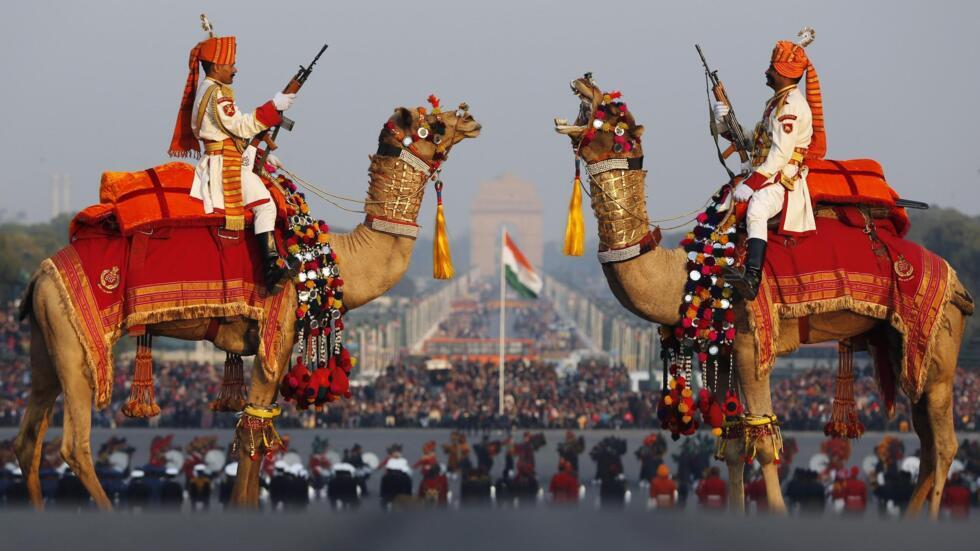Hollande in India to sell warplanes, nuclear power, metro construction
French President François Hollande was welcomed to Delhi by his Indian counterpart Pranab Mukherjee with great pomp on Thursday morning for a two-day visit during which the world’s biggest current defence deal is to be discussed.
Issued on: Modified:

In a rare declaration in English, Hollande said it was “a great honour for me and for France to visit India” after a 21-gun salute heralded his arrival at the presidential palace.
The Indians have adapted their diplomatic procedures so as to involve Hollande’s partner, Valérie Trierweiller, in the proceedings, the first time an unmarried woman has received the treatment normally accorded to a spouse.

Hollande, who is accompanied by a large delegation of five ministers and about 60 businessmen, was also to meet Prime Minister Manmohan Singh, Congress Party leader Sonia Gandhi and Sushma Swaraj of the opposition BJP in Delhi.
On Friday he goes to Mumbai to address business leaders.
What will be discussed:
- The Indian airforces’s purchase of 126 Rafale warplanes from arms manufacturer Dassault: Chief Executive Eric Trappier is on the delegation to further the biggest defence contract currently being negotiated, worth nine billion euros. India chose the firm last year but says the deal will not be signed until mid-year. It has had the opportunity to see the product perform during France’s intervention in Mali, as well as in Afghanistan and Libya.
- The construction of two nuclear reactors by Areva in Mahrashtra state: A seven-billion-euro framework agreement was signed during Sarkozy’s 2010 visit but the 9,900-megawatt pla,nt at Jaitapur, 400 kilometres south of Mumbai, but it has run into opposition from environmentalists in the wake of Japan’s Fukushima nuclear disaster. The authorities, while saying they are “fully committed” to the plan but say there are “issues pertaining to cost”.
- The Bangalore metro: Engineering and construction company Alstom is pitching to build the hit-tech hub’s underground and several other companies are after contracts in infrastructure and urban development.
- The UN Security Council: India wants a permanent seat and Sarkozy backed the call for opening up the UN’s top body to developing nations. Hollande says he will do the same.
What will not be discussed:
- The ArcelorMittal affair: Although Mittal is Indian, his company is not, so New Delhi has refrained from official intervention in the row, despite criticism in the Indian media of alleged “xenophobia” in the French reaction to the closure threat.
- A rape accusation against a French consul employee: Pascal Mazurier, employed in France’s consulate in Bangalore, is out on bail and forbidden to leave the city after spending four months in detention. His wife, Suja Jones, who is of Indian origin, accuses him of raping their young daughter. Earlier this week Jones asked to see Hollande, pointing out that her husbands lawyers were received at the Elysée presidential palace on 8 February.
Hollande is less well-known in India than his predecessor Nicolas Sarkozy, who visited in 2008 and 2010, writes Tirthankar Chanda on RFI’s website in French.
France and India have worked together for a long time [...] Today we're discussing Rafale jets. We've made progress toward an the agreement and I believe that we can see it through to its conclusion.
“New Delhi appreciates the fact that he chose India as his first destination in Asia as president, ahead of China,” Chanda says.

But French Industrial Renewal Minister Arnaud Montebourg’s threat to nationalise a blast furnace owned by AreclorMittal, a Luxembourg-based company headed by Indian tycoon Lakshmi Mittal, which is set to close, reportedly shocked many Indian bosses.
And France’s early withdrawal of its troops from Afghanistan is said to have annoyed Indian foreign policy-makers.
Although France has good relations with India, particularly since the 1990 visit by then-president Jacques Chirac and the latter’s tolerant approach to its 1998 nuclear tests, which were condemned by other major powers.
But trade last year was only 7.5 billion euros, about the same as Franco-Turkish commercial exchanges, and France buys more than it sells.
Daily newsletterReceive essential international news every morning
Subscribe